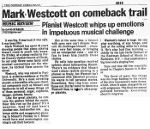Mark Westcott on Comeback Trail

It was big, it was loud, it was ugly, it was beautiful.
Mark Westcott has spent 20 years showing people that piano playing doesn't come in small, tidy boxes. On Friday, at a piano recital on Forest Grove's United Church of Christ, he not only threw some fairly solid musical conventions out the window, he kicked them across the street.
Westcott, who was raised in Portland, is artist-in-residence at Pacific University. He's a most arresting pianist, a storyteller who uses classical composers such as Mozart and Beethoven to tell of many things, all of them personal: anger, euphoria, danger, sadness, beauty.
Like the great pianists, he conveys the gesture behind the music. Hear this run up the piano? It's a question, hear it? And here's another one. And another one. His tempo shifts and exaggerated phrasing in Mozart's Fantasy in C Minor would have sent musicologists running to call their lawyers.
But at the same time, a listener with open ears can't dismiss Westcott. He challenges himself - choosing a very fast tempo, or bringing out an unexpected voice - and it's fun to hear him justify those choices.
He calls into question received opinion about interpreting Mozart. There's no evidence that Mozart used rubato (subtle slowing in a phrase) so freely, but Westcott isn't concerned with historical accuracy. He wants to tell personal stories. Sometimes, they ring true, sometimes not. But far better to listen to a Westcott than to today's ultra-proper pianists.
Westcott's talent is huge. He can play anything, at any tempo, and look at the ceiling while he's doing it. He's also had fine training - chiefly by the late Cecile Genhart of the Eastman School of Music in Rochester, N.Y. - that emphasizes a big tone and a singing line.
Tone and line did him especially proud in Chopin's Sonata in B Minor.
The finest of many fine things was his huge buildup to the return of the slow movement's main theme which, when it came, charged the air with poignancy. The final movement galloped heroically. Everything about it rang true.
DAVID STABLER of The Oregonian staff
Copied by Ben Serna-Grey
comments powered by Disqus